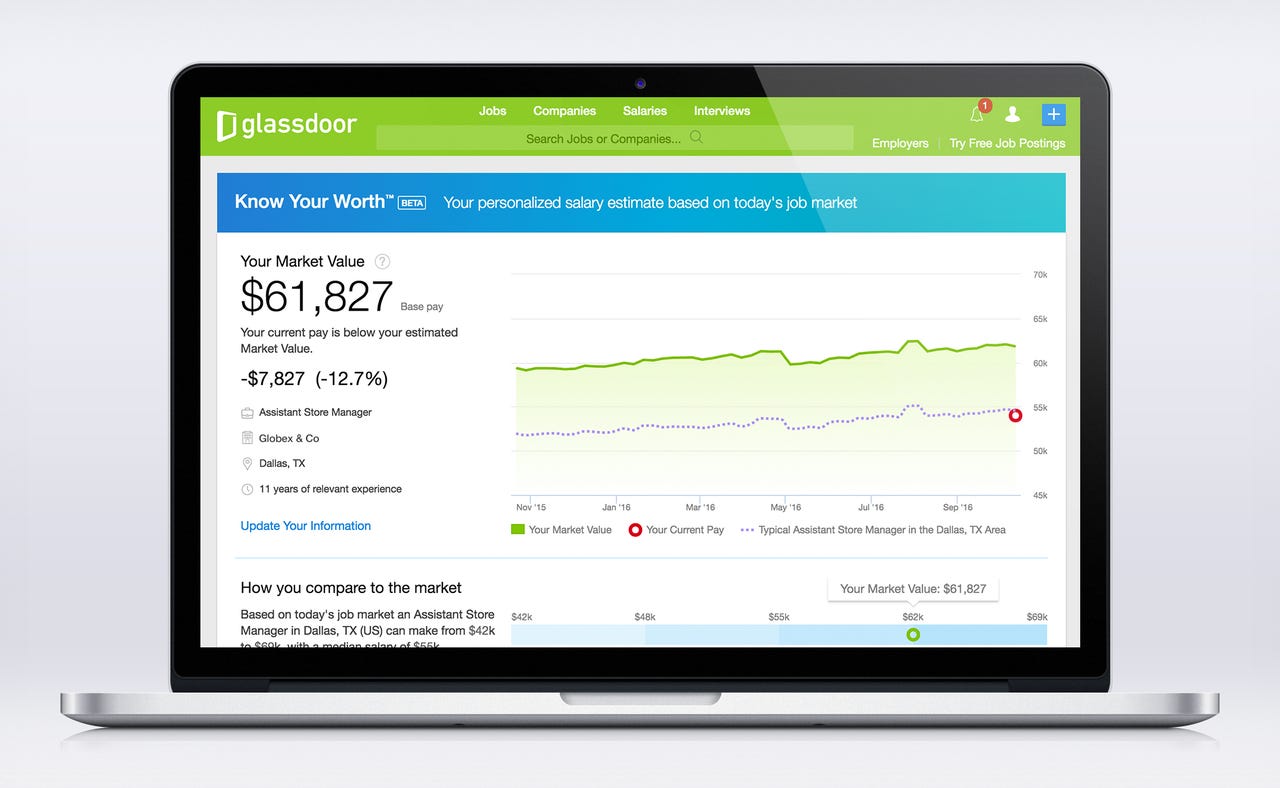Glassdoor uses machine learning to tell users if they're being paid fairly

For the past eight years, Glassdoor has given workers a place to discreetly share information about their salaries and their work environment. The site now attracts 33 million people each month and has amassed reviews, ratings and salary information for around 600,000 companies in 190 countries.
Glassdoor is now harnessing all of that data it's collected -- from its salary database in particular -- to give users a better understanding of whether or not they're being paid fairly. The free "know your worth" tool that's being rolled out in beta this week asks users to input some basic information including their job title, employer, current salary, location and relevant work experience. With that, Glassdoor is using a proprietary machine learning algorithm to calculate an individual's "market value" -- the median base pay he or she could potentially earn in their local job market.
The tool analyzes the millions of salary reports in its database, as well as real-time supply and demand trends in local job markets and typical career transitions of people doing similar work. Along with giving a current "market value," it shows a user his or her "market value" over a 12-month period, as well as the typical pay for workers with similar titles in the same geographic area.
For instance, in the example below, an assistant store manager in Dallas, Texas learns that his salary is in line with the typical salary of an assistant store manager in Dallas. However, because he has 11 years of experience, his "market value" is much higher.

There won't always be enough relevant data in Glassdoor's database for users to get a legitimate estimation of their market value. In those cases -- which Glassdoor expects to see about 40 to 45 percent of the time in the initial beta -- users will be alerted once a calculation is possible. They'll be pointed to another new feature called Salary Explorer to learn more about their job market.
The Know Your Worth tool is also currently limited in that it only evaluates base pay -- it doesn't take into account other types of compensation such as benefits or bonuses. However, as Glassdoor collects more data, it should be able to use machine learning to improve the tool and add more variables.
The tool already asks users for their gender and age, so that eventually it could potentially help shed enough light on unfair wage gaps to ultimately eliminate them.
"The goal is to help people understand fair pay, period," Scott Dobroski, community expert at Glassdoor, told ZDNet, "to help eliminate existing pay gaps, whether it's through gender or ethnicity."
While it may take some time to accomplish that larger objective, Glassdoor can for now help individuals get information they're looking for: In a survey of US employees that Glassdoor commissioned, 65 percent said they wanted a better understanding of the fair market compensation for their position, at their company, within their local job market.
Meanwhile, as more employees input their data, the more Glassdoor becomes a valuable tool for the companies doing the hiring. The late-stage startup brings in revenue by offering paid products and services for employers, such as job listings that target job seekers who match certain variables like skill level and experience. The company currently has about 4,400 employers using its paid services.
"We know when workplace transparency increases, some employers might be surprised or uncomfortable with this at first," Dobroski said. "They shouldn't be."
Creating more realistic salary expectations for job seekers leads to better recruitment and retention rates, he said. "You have the majority of people saying, 'I want more information,' and the employers who put it out there will become more attractive places to work."
And as Glassdoor continues to invest in areas like machine learning, its services for other businesses will only improve. The company, which currently has more than 15 data scientists on staff, received $40 million in a Series H round of funding over the summer, bringing its total funding to $200 million. Its investors include Google Capital, T. Rowe Price, Sutter Hill Ventures and Tiger Global.